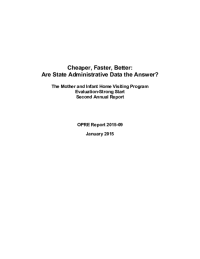Cheaper, Faster, Better: Are State Administrative Data the Answer?
The Mother and Infant Home Visiting Program Evaluation-Strong Start Second Annual Report

Home visiting programs, which provide individualized education, support, and referral resources, often serve disadvantaged women whose families are at risk for adverse health outcomes. The Mother and Infant Home Visiting Program Evaluation-Strong Start (MIHOPE-Strong Start) is examining the effectiveness of home visiting services on improving birth and maternal health outcomes for women who are enrolled in Medicaid or the Children’s Health Insurance Program (CHIP), as well as their effectiveness at reducing costly health care encounters. MIHOPE-Strong Start is sponsored by the Center for Medicare and Medicaid Innovation (CMMI) of the Centers for Medicare and Medicaid Services (CMS), the Office of Planning, Research and Evaluation (OPRE) in the Administration for Children and Families (ACF), and the Maternal and Child Health Bureau (MCHB) of the Health Resources and Services Administration (HRSA). The study uses a random assignment design, and is conducted by MDRC in partnership with James Bell Associates, Johns Hopkins University, and Mathematica Policy Research.
This report details MIHOPE-Strong Start’s process of acquiring administrative vital records and Medicaid data from 20 states and more than 40 state agencies. The study relies on administrative data to measure infant and maternal health, health care use, and cost outcomes. Policymakers have increasingly encouraged greater access to and use of administrative data to produce timely, rigorous, and lower-cost evaluations of health and social programs, since these records may be less costly and more accurate than information collected directly from families. The MIHOPE-Strong Start experience sheds light on the process of acquiring permission to access such data. Specifically:
- As of this report’s writing, legal agreements to acquire administrative records have been successfully reached with 19 different state agencies in 20 states. Among these first 19 agreements, it has taken an average of 11 months to complete all the necessary steps to execute them.
- The MIHOPE-Strong Start team has faced a number of challenges in gaining access to administrative records, the most significant of which is time. Administrative data acquisition — beginning with initial outreach, progressing to reviews of application materials and informed consent forms, and culminating with a legal agreement to receive the data — can be a lengthy process, but the time frame is highly variable. In MIHOPE-Strong Start, the process has lasted anywhere from a few months to two years. And not all states are willing to share the Medicaid and birth record data with personal identifiers that MIHOPE-Strong Start requires.
- Lags in data availability can be lengthy as well. For vital records, the wait time can be longer than two years from the beginning of the calendar year in which the birth occurred.
- The process may be easier with state agency support or with the use of national databases. Administrative data acquisition is likely to be smoother if the research study is supported or commissioned by the state agency that collects the data needed. Alternatively, national administrative databases can potentially help overcome the hurdles associated with accessing administrative data across multiple state agencies. Delays in the availability of these data and limitations in linking them to other data sources made them unusable for MIHOPE-Strong Start.






